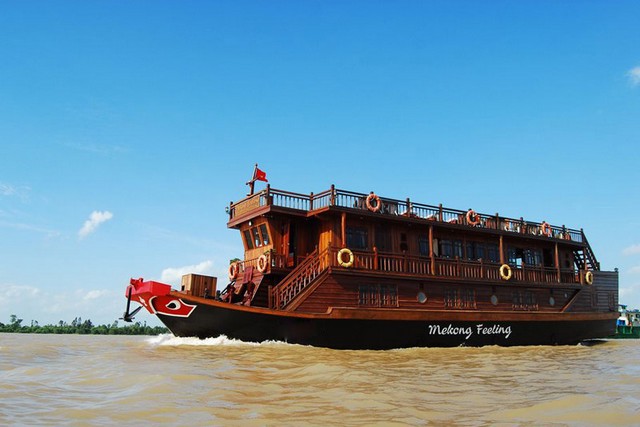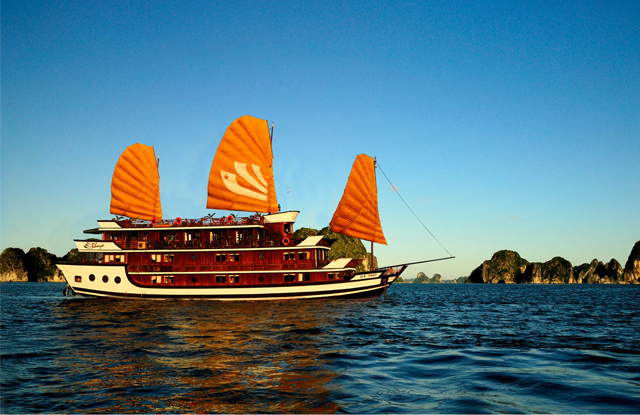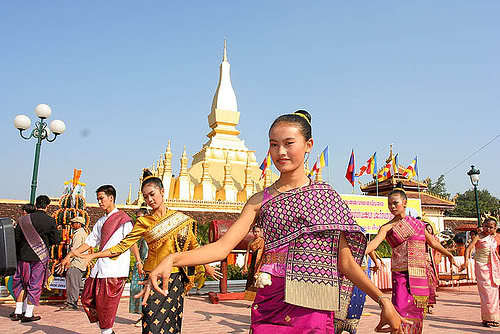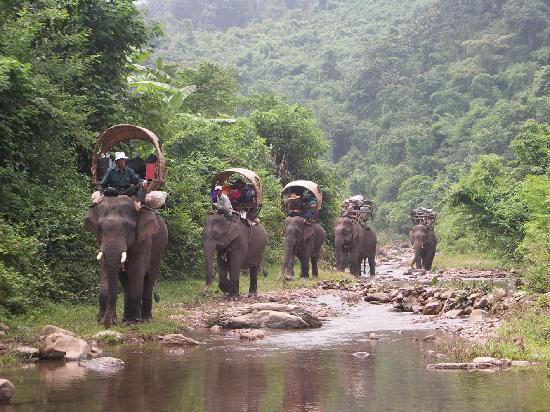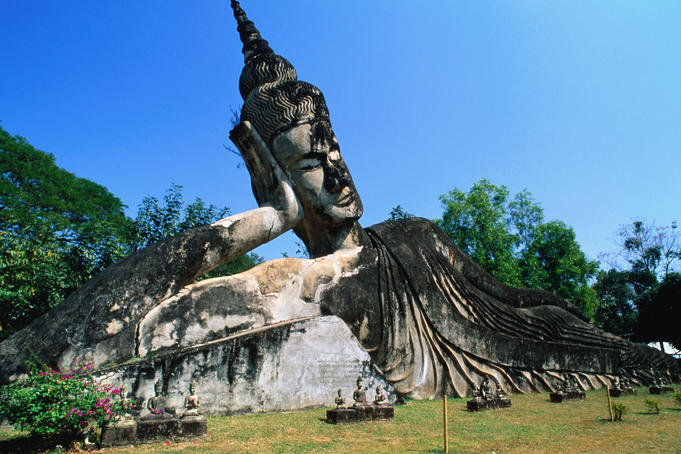- vietwaytravel.info
- --- Vietnam Overview
Vietnam Overview
CLOTHING:
Comfortable lightweight clothing in natural fabrics such as cotton is most suitable for traveling in Vietnam, Myanmar, Cambodia & Laos. The dress code is fairly casual as in most parts of the tropics but it is advisable to cover arms and legs in the evenings against biting insects. A lightweight raincoat is a good idea in the rainy season. During the winter months warm clothing is needed for visiting the north of Vietnam, Myanmar and Laos. Visitors to Buddhist countries should not wear shorts, short skirts or other skimpy clothing when visiting religious buildings and shoes should be removed before entering a private home.
ELECTRICITY:
Almost the hotels use 220V but in some local areas 110V is also used. Connections are either a round two-pin plug or a flat two-pin plug. Beware if you are using electrical appliances and laptop computers, as there are power surges and frequent power cuts.
FOOD:
The cuisine of Vietnam comes as a pleasant surprise to many visitors and is definitely a part of the Vietnam experience not to be missed. One of the characteristics of Vietnamese food is that it is always fresh being bought the same morning straight from the market. Food is usually prepared with a minimum of oil and served with the ubiquitous fish sauce called “nuoc mam”. Typical Vietnamese dishes you can expect to try include pho, a type of rice noodle soup eaten for breakfast, cha gio, deep-fried spring rolls and goi ngo sen, a delicious salad made with lotus stems, shrimps and peanuts. Due to the strong Buddhist influence in Vietnam, vegetarian food is widely available. Vietnam food is a suggestion for every traveler and often be served in almost restaurant. For other special request for food you should inform Vietnam Holiday before departure for a better arrangement.
HEALTH:
No vaccinations are required except for yellow fever if you are coming from an area where the disease is present. However visitors should be inoculated against typhoid, cholera, hepatitis A & B, tetanus and polio. Malaria is present in most of the region and it is advisable to take precautions especially if traveling off the beaten track. Medical facilities are rather limited in all countries and it is essential to take out a good medical insurance policy and some medicine before traveling in case evacuation is needed.
HOURS OF BUSINESS:
Offices are usually open from Monday to Friday from 07:30 or 08:00 until 17:00 or 18:00 and often close for lunch between 11:30 and 13:00. Some offices also open Saturday morning. Shops open around 9:00 and close any time between 18:00 and 22:00. Most shops are open 7 days a week.
LANGUAGE:
Because Vietnamese has six different tones, it is a difficult language for most foreigners to speak despite the fact that the Roman alphabet is used in modern Vietnamese. The same word can have six different meanings depending on the tone used to pronounce it. In the cities and larger towns English is becoming popular and is now spoken by many younger people while some of the old generation still speak fluent French. Russian and Chinese are also spoken by some people in some Vietnam-Chinese border towns.
MONEY:
The currency in Vietnam is the Vietnamese Dong although US Dollars are accepted in many hotels, restaurants and shops. Banks are open Monday to Friday and some are open Saturday morning. In the major cities there are bureau to change and most hotels will change US Dollars although for other currencies it is usually necessary to visit a bank. Traveler’s cheque can be exchanged at banks and some exchange bureau but can be difficult to change outside of the major cities. Visa Card and Master card are now accepted in many hotels, restaurants and shops but US Dollars cash are still the most reliable form of money to carry. There are many ATM machines now in Ho Chi Minh City and Hanoi. If you pay by Credit Card there will be a surcharge of bank transfer for about 3% total amount everywhere in Vietnam. For the big amount receipt, it is advised to pay by card such as restaurant, hotel etc but for other small expenditure you would better pay in cash and in Vietnamese dong.
PUBLIC HOLIDAYS:
January 1: New Year’s Day
January/February: Tet or Vietnamese New Year.
10 Mar: Day to commemorate King Hung – the first King of Vietnam.
April 30: Liberation of Saigon Day
May 1: International Labour Day
September 2: National Day
RELIGION:
Buddhism is the dominant religion in Vietnam usually combined with elements of Confucianism and Taoism. About 10% of the country’s population is Catholic and there are also communities of Protestants and Muslims. Vietnam is also home to a unique religion called Cao Dai, a religious cocktail of all the world’s major faiths.
SHOPPING:
Souvenirs to look out for in Vietnam include lacquerware, silk, conical hats, woodcarvings, hill tribe fabrics and handicrafts, embroidery, marble, ceramics, silver jewellery, antique watches and paintings. Ho Chi Minh City and Hanoi have the best choice when it comes to shopping but Hoi An in the centre of Vietnam is also a very good place to hunt for bargains.
TELECOMMUNICATIONS:
Most hotels now have IDD phones in rooms and it is possible to send faxes from hotels and post offices although be warned these services are expensive in all four countries. Away from the major cities it may not always be possible to make international calls. Cyber cafes are becoming popular in the major cities in Vietnam, Cambodia and Laos (but not Myanmar) and many travelers now prefer to keep in touch by e-mail. Post cards can be bought at all the main tourist sites and stamps are available from post offices and some hotel reception desks. It is not permitted to bring mobile phones into Myanmar. Even if they are not connectable in Myanmar to international network such as GSM, they’ll be confiscated upon arrival at Yangon International Airport and released only upon departure. You should notice that all the telephone numbers of Vietnam now must be added 3 or 2 or 6. Number 3 is added to Vietnam telecom’s numbers with the start numbers of 5, 6, 7, 8, 9, for example the old one is (84 4) 9285588 will be changed to (84 4) 39285588. Number 6 is added to Viettel telecom, number 2 is added to Electric telecom both start with 2 number.
TIPPING:
Tipping for good service is not expected but is always appreciated in these developing nations. It is customary, though not compulsory, to tip tour guides and drivers at the end of a tour. Hotel and station porters should also be tipped.
VISAS:
Almost visitors are required to have a valid visa to enter Vietnam except for some special countries which have the commitment to exempt their citizen from visa. For other a one-month tourist visa is usually sufficient for most visitors though it is possible to arrange 3-month and 6-month multiple entry visas for regular visitors. All visitors must obtain visa approval from the Vietnamese Immigration Department before a visa is issued. Hanoi Red Tours can arrange for a visa authorization to be sent to the Vietnamese embassy or consulate where the visa is to be collected once the following information has been forwarded: full name, date of birth, nationality, passport number and sex. This information should be forwarded at least one month before departure. One copy of the visa authorization will be sent to the embassy or consulate where the visa is to be collected and a second will be forwarded to the person collecting the visa. A fee is payable to Hanoi Red Tours for the visa authorization and to the embassy or consulate for the visa stamping. The person collecting the visa must complete two application forms and hand these in with two passport photos when collecting the visa. In situation where it is more convenient Hanoi Red Tours is also able to pre-arrange visas on arrival at Noi Bai Airport in Hanoi, Danang International Airport in Danang and Tan Son Nhat Airport in Ho Chi Minh City. In addition to the cost of visa authorization a fee is payable on arrival at the airport for visa stamping. The same authorization procedure and a minimum of 5 working days notice is required. In urgent cases Hanoi Red Tours can arrange a visa on arrival if notice of 2 working days is given. There are additional charges for this service. On entering Vietnam all visitors must complete a entry/exit form including a customs declaration (white/yellow color). It is important that the bottom copy (yellow sheet) of this form is kept safe with your passport while in Vietnam and is presented to the customs and immigration officials on departure.
WATER:
It is not advisable to drink tap water in Vietnam, Cambodia, Laos or Myanmar but bottled mineral water is safe and available everywhere. Ice in drinks is generally OK in good standard hotels and restaurants but it is best to avoid it on street stalls or in country areas.
Hanoi and the north of Vietnam have a distinct winter and summer season with the mainly dry winter lasting from November through to April with average temperatures of 18-20oC. Summer lasts from May to October and is hot and humid with temperatures around 30oC. Hue and Danang in the centre of the country have very hot, dry weather from February to August with temperatures reaching the mid 30′s Celsius, but can experience some quite heavy rainfall between September and January. Ho Chi Minh City and the south have a hot, dry season from December till April with average temperatures around 28oC and a rainy season lasting from May through till November. It rarely rains for long periods even in the rainy season with most rain coming in short, heavy bursts. Recent time, the weather changes unexpectedly so you should prepare to adapt to.







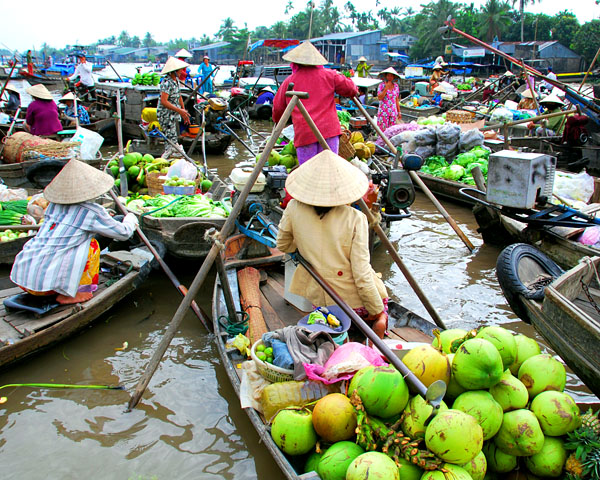
.jpg)
.jpg)
